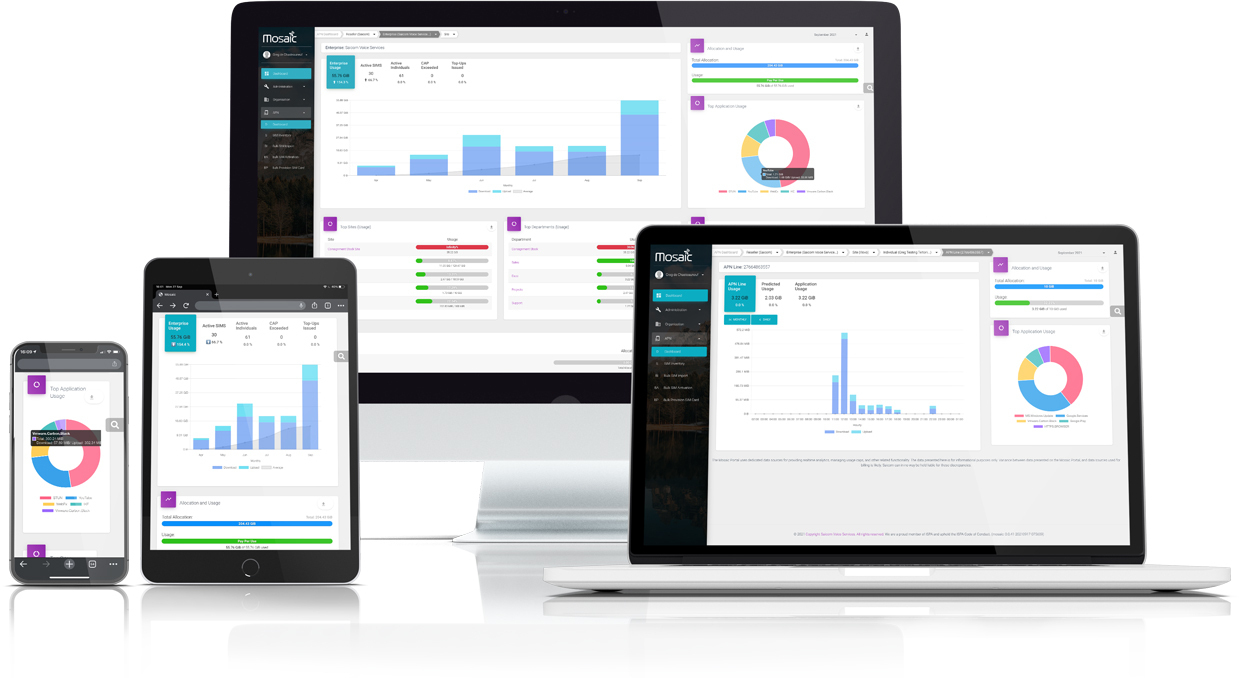In South Africa’s rapidly evolving digital landscape, selecting the right mobile APN provider is crucial for seamless connectivity and robust online performance.
This guide provides essential insights into navigating the complexities of APN services and making an informed choice. Whether you’re a business seeking enhanced security, a startup in need of scalable solutions, or simply aiming for reliable internet access, understanding the nuances of various APN options is key.
Dive in to discover how to find a mobile APN provider in South Africa that aligns perfectly with your connectivity needs and digital goals.
Key takeaways
- APNs’ central role: APNs are critical for seamless, secure mobile connectivity, vital in South Africa’s growing digital economy.
- Managed APNs benefits: Offer better security, flexibility, and efficient data management, ideal for businesses needing tailored network solutions.
- Specialised APN services: South Africa’s APN providers cater to diverse needs, from IoT specialisation to enhanced security, ensuring wide-ranging support.
- Importance of network performance: Superior network performance and reliability are crucial for maintaining efficient operations and customer satisfaction.
- Security and device compatibility: Essential considerations include robust security features and wide-ranging device compatibility to safeguard data and ensure seamless connectivity.
- Management tools and support: High-quality APN services come with comprehensive management portals and expert support, enhancing operational control and problem resolution.
Table of contents
- Key takeaways
- Understanding mobile APN services & providers in South Africa
- The importance of network performance, data speed, and reliability
- Evaluate APN security and privacy features
- Consider a mobile APN’s compatibility with devices
- Evaluate your data usage & prices or data plans from providers
- Assess the APN provider’s customer service & technical support
- Expertise and knowledge in technical support
- Word-of-mouth and recommendations from peers & experts
- Explore the management portal functionality: Analytics, reporting, capping, top-ups & more
- Final thoughts on choosing a mobile APN provider in South Africa
Understanding mobile APN services & providers in South Africa
In the burgeoning digital age, mobile connectivity plays a key role in shaping businesses, fostering education, and facilitating day-to-day activities.
For South Africa, a nation experiencing a digital renaissance, understanding the intricacies of mobile APN services and providers isn’t merely an advantage but a necessity.
Here’s a deep dive into the role and importance of APN services and providers.

The essence of APN services
At the heart of our devices’ reliable connectivity lies the Access Point Name (APN). It serves as a critical bridge, ensuring the seamless flow of data between SIM cards and company networks via the carrier’s infrastructure.
An APN’s primary function is to securely tether your mobile device’s SIM card to specific networks, be it a public APN, private APN, or shared APN.
Managed APNs – a cut above the rest
Managed APNs are gaining ground, especially for businesses prioritising enhanced security and efficient data management. Compared to traditional public APNs, managed APNs offer:
- Enhanced Security – With threats escalating in the digital realm, managed APNs provide an additional layer of protection, minimising potential breaches.
- Flexibility & Scalability – Businesses can modify settings based on their evolving needs, ensuring sustainable growth.
- Private IP Addresses – Unlike the commonly used public addresses, managed APNs allow for unique private IP addresses, boosting security and tailored network configurations.
- Pooled Data – A standout feature of managed APNs is the ability to pool data, ensuring that resources are judiciously utilised and costs are managed more effectively.
Advanced features for the discerning user
As technology pivots towards more integrated and interconnected solutions, businesses and users should look out for APN providers offering:
IoT-ready endpoint security – With the Internet of Things (IoT) revolutionising industries, having APN services that are prepared for these advancements is crucial.
Customisable firewalling – To ensure data safety, some APN providers offer firewalling options that can be tailored to specific security requirements.
Customisable SIM options – Catering to a range of devices and applications, these ensure that connectivity remains unhindered regardless of the device in use.
In wrapping up, as South Africa continues to advance its digital footprint, the importance of understanding and choosing the right APN service becomes ever more salient.
Whether opting for a public APN, private APN, shared APN, or a managed APN, the decision profoundly impacts the security, efficiency, and potential of one’s digital endeavours. In a related post we explore the benefits of mobile APNs for businesses.

Types of APN providers in South Africa
South Africa boasts a diverse array of APN providers, catering to the unique and evolving demands of its vibrant digital landscape. These providers offer varied services across major networks, ensuring seamless connectivity regardless of the chosen mobile network.
Interoperability is a notable feature, wherein certain providers ensure their APN services can effortlessly integrate across multiple mobile networks. This ensures that users, especially businesses, don’t find themselves tethered to a single network and can transition based on their requirements without sacrificing the benefits of their chosen APN provider.
APN provider specialisations – meeting diverse needs
APN providers in South Africa have evolved beyond mere connectivity providers. Recognising the multifaceted demands of different sectors, many have crafted bespoke offerings, including:
- IoT & M2M specialisation – The rise of the Internet of Things (IoT) and Machine-to-Machine (M2M) communication has paved the way for APN providers specialising in these domains. Catering primarily to sectors such as logistics, healthcare, and retail, these providers offer seamless connectivity solutions, ensuring devices and machinery communicate effortlessly. With advancements such as NB-IoT (Narrowband IoT), APN providers are further elevating the game, providing low-power wide area network technology solutions.
- Robust security features – In an era where data is invaluable, security becomes paramount. Certain APN providers recognise this and specialise in offering advanced security features. These are especially attractive for businesses handling sensitive information, ensuring that their mobile data and cellular data remain impervious to threats.
- Network diversity – While specialisation is a hallmark of modern APN providers, versatility in terms of network compatibility remains crucial. The best providers ensure their services are robust across mobile networks, ensuring businesses and individual users enjoy unhindered connectivity.
In summary, the realm of mobile APN providers in South Africa is as diverse as it is dynamic. Whether you’re a business venturing into the IoT domain, an enterprise with critical data security needs, or simply seeking reliable connectivity across networks, there’s an APN provider poised to meet your demands.
Contact Saicom today to find your ideal mobile APN solution, tailored to your unique connectivity and security needs.

8 Steps for selecting the right mobile APN provider in South Africa
To assist during the decision-making process, we’ve outlined eight comprehensive steps that will guide you through evaluating APN providers while considering the requirements of your business.
From understanding your data requirements to considering the level of service and support can offer, each step is designed to help you choose an effective mobile APN solution to suit your needs from the right provider.
1. The importance of network performance, data speed, and reliability
Selecting the ideal mobile APN provider for your business is a pivotal decision that goes beyond mere connectivity. It’s about securing a partnership with a provider that offers superior network performance, lightning-fast data speeds, and unwavering reliability.
This section is dedicated to exploring these essential elements, emphasising their critical role in ensuring seamless business operations, enhancing customer satisfaction, and supporting your scalability ambitions in the digital landscape. Here, we aim to equip you with the necessary insights to make an informed choice, ensuring your business not only stays connected but thrives in the competitive digital ecosystem.
APN provider’s network performance
In today’s rapidly evolving digital landscape, the performance of an APN provider stands as a linchpin for businesses to function effectively. When we speak of performance, it is not merely about having a connection; it’s about the quality, speed, and resilience of that connection.

Why network speed and resilience matter
Network speed and resilience are crucial for maintaining efficient and reliable mobile connectivity. Below, we explore their importance in ensuring seamless business operations and consistent customer satisfaction.
Seamless operations
Every business, whether it operates predominantly online or not, relies on mobile data connectivity to some degree. Faster network speeds ensure that operations, from sending emails to conducting video conferences or accessing cloud databases, proceed without interruption.
Customer satisfaction
In a world where customers expect instantaneous results, a slight delay caused by slow data connectivity can lead to dissatisfaction. Speedy mobile networks mean faster response times, leading to happier customers and potentially increased business opportunities.
Data-intensive tasks
As businesses integrate more technology, they often deal with larger data sets. Rapid data connectivity is vital, whether it’s a retail outlet managing its inventory or a tech firm running complex algorithms.
Network resilience
Network resilience is about how your chosen APN provider’s network can withstand and recover from difficulties, such as high traffic volumes or external threats. In an era where operations run round the clock, businesses can’t afford prolonged downtimes. A resilient network minimises disruptions.
Security and private networks
Businesses handling sensitive data often seek a private network. These private networks, isolated from public networks, offer enhanced security. The performance of such networks is crucial, ensuring that while data remains secure, it’s also accessible at the required speeds.
In conclusion, when evaluating an APN provider, it’s not just about who can provide a connection, but who can offer swift, resilient, and secure mobile data connectivity. In a business world that waits for no one, ensuring your operations have the best network backing them up is paramount.
Data speeds and reliability
When it comes to choosing a mobile APN provider, many factors are worthy of consideration. However, the most key criteria are data speeds and reliability. The marriage of these two elements holds paramount importance in defining the quality of any mobile connection.
Impacts of reduced speeds and unreliable connections
- User satisfaction: In an age of instant gratification, a delay of even a few seconds can drastically affect user satisfaction. Whether it’s a video call, streaming service, or a simple web page load, users expect swift responses. Slow data speeds can lead to frustration and a decline in the perceived quality of service.
- Productivity: For businesses, especially those that rely on real-time data transfers or operate in cloud environments, reduced speeds can be detrimental. Time-sensitive tasks get delayed, potentially leading to financial losses or missed opportunities.
- Operational processes & transactions: Imagine an online retailer unable to process orders due to a sluggish internet connection, or a bank where transactions timeout due to connectivity issues. A reliable network is not a luxury but a necessity, ensuring operations proceed unhindered and transactions conclude seamlessly.
Factors Affecting Data Speeds and Reliability
- Type of network: The choice between 4G LTE and 5G can drastically affect speeds. While 4G LTE networks offer speeds up to 100 Mbps, the newer 5G networks boast speeds up to 1 Gbps, enhancing user experiences.
- User traffic: High traffic, especially in densely populated areas, can reduce individual data speeds. An efficient mobile APN provider should be equipped to manage high traffic volumes effectively.
- Proximity to cell tower: The closer a mobile device is to a cell tower, the better the signal strength, leading to improved data speeds and connection reliability.
- Device type: Modern devices are better equipped to handle faster speeds and maintain consistent connectivity. Older devices might not harness the full potential of a high-speed network.
- Types of data: Streaming HD videos or transferring large files requires more bandwidth than sending emails or browsing text-heavy websites.
- SIM card configuration: Businesses using multiple SIM cards or those that switch between multiple networks might experience variances in data speeds and reliability, depending on the configurations and capabilities of the respective networks.
In conclusion, the search for the ideal mobile APN provider is anchored in the pursuit of top-notch data speeds and unwavering reliability. In an interconnected world, where every second counts, businesses and individuals alike should prioritise these factors to ensure they remain agile, satisfied, and ahead of the curve.
Ensure your business thrives with Saicom’s exceptional network performance, lightning-fast data speeds, and unmatched reliability. Contact Saicom now to secure a mobile APN solution that supports your growth and operational efficiency.
2. Evaluate APN security and privacy features
In the vast realm of digital communication, one factor stands head and shoulders above the rest: security. As businesses and individuals alike become increasingly interconnected, the necessity of prioritising APN security has never been clearer. It’s not merely about being connected; it’s about ensuring that connection is robustly safeguarded against potential threats.
When selecting a mobile APN provider, security should be a top concern. Quality providers go beyond offering just connections; they present secure avenues through private APN security.
These private APNs not only offer secure connections but also empower users with enhanced control over security settings. The ability to customise network settings to align with unique business needs can be pivotal in ensuring data protection.
In the following sections, we’ll explore the specific security and privacy features provided by APN providers. From the bedrock of secure connection protocols to the nuanced world of customisable firewalling and filtering, we’ll cover what you need to know.

Assess secure connection protocols
The very fabric of a secure network lies in its connection protocols. It’s these protocols that ensure that every piece of data, every communication transmitted over the network, is not just sent, but sent securely. They encrypt data, turning it into indecipherable code for any potential eavesdropper, ensuring only the intended recipient can access it.
Choosing an APN provider that champions robust secure connection protocols is non-negotiable. Consider providers that utilise VPNs fortified with Internet Protocol security (IPSec). This layer of protection not only ensures encrypted communications but also acts as a bulwark against unauthorised access, safeguarding your business data and communications at every juncture.
In an age where data breaches and cyber threats are, unfortunately, commonplace, the importance of APN security cannot be overstated. A mobile APN provider that prioritises secure connections through features like private APN security should be at the top of your list. After all, in the world of digital connectivity, security isn’t a luxury—it’s a necessity.

Find out about customisable firewalling and filtering
The digital realm is a vast and interconnected ecosystem, where data flows continuously like water in a river. However, just as water needs to be purified before consumption, digital data needs its safety filters. Enter the world of customisable firewalling and filtering – the unsung heroes maintaining the sanctity of countless networks across the globe.
Understanding customisable firewalling and filtering
Customisable Firewalling is the overarching boundary of your digital estate. Like a protective barrier, it examines and regulates data packets flowing in and out of a network.
By adjusting the network settings, users can specifically dictate which type of traffic is allowed or denied. The process, known as packet firewall filtering, scrutinises data packets and decides their fate based on preset criteria.
Filtering digs deeper. Beyond the broad strokes of firewalling, filters work on the finer details. They offer options like:
- App-based filtering: Tailors network access at the application level, granting or denying specific apps from accessing the network.
- URL filtering: Focuses on web domains. By adjusting these settings, users can block or permit access to specific websites.
- DNS-based filtering: Targets domain name requests, thus preventing access to domains that might be deemed harmful or inappropriate.
Combining firewalls with content filtering
When we discuss a content filtering firewall, we’re delving into a hybrid model where both firewalling and filtering functions coalesce.
This model doesn’t just restrict traffic based on source or destination; it takes into account the very content of the data packets. So, with firewall web filtering, it’s not just about where the data comes from, but what the data contains.
The need for customizability in firewalling and filtering
The bespoke nature of business and individual needs necessitates flexibility in security protocols. The importance of ensuring your APN provider offers this level of customisability cannot be understated for several reasons:
- Holistic security: While a packet firewall filtering system restricts traffic, adding content filters like app, URL, and DNS-based filtering fortifies the security framework.
- Tailored protection: Each business has its unique digital footprint and threat landscape. Customisable settings allow for a defence mechanism tailored to specific needs
- Network integrity: A system equipped with both firewalling and advanced content filters ensures that the network remains pure and uncompromised, filtering out both known and emerging threats.
In essence, the journey of selecting an APN provider should undeniably factor in the prowess of their customisable firewalling and filtering offerings. It’s a proactive step that ensures that as the digital world evolves, your security measures remain agile and robust, always keeping pace.
Advance your network’s security with customisable solutions that grow with you. Contact SAICOM today to explore how our APN services can protect and empower your digital journey.
3. Consider a mobile APN’s compatibility with devices
In an age where seamless integration of devices defines the essence of smooth operations, understanding APN compatibility has evolved from technical jargon to a pivotal business decision.
The market offers a wide range of devices – from Android smartphones and Apple devices to intricate routers and the burgeoning M2M IoT devices. The efficiency of these devices doesn’t merely hinge on their individual capabilities but profoundly on how well they synchronise with your chosen mobile APN. In this section, we explore the importance of APN compatibility across various devices.
APN compatibility and its underlying importance
- Device potential realisation: An Android phone or an Apple device is as good as the network settings it can support. Ensuring APN compatibility means you’re not just connected, but optimally connected, leveraging the full potential of the device in hand.
- M2M and IoT harmony: The rapidly expanding world of M2M and IoT hinges on uninterrupted and secure data transfer. Choosing an APN provider whose APN solution integrates seamlessly with these devices ensures that data flows, updates are received, and commands are sent without any hitches.
- Router compatibility: Routers, the gateways of digital ecosystems, need to be compatible with the APN settings they are configured with. An incompatible APN solution can cripple data flow, leading to slowdowns or even total blackouts.

Android phones and tablets
Android phones and tablets typically boast broad compatibility with a variety of mobile APNs. This inherent capability ensures that Android users can connect to the internet seamlessly, provided the device supports the specific APN settings of their chosen mobile provider.
The key to a smooth, uninterrupted online experience lies in confirming the compatibility of your Android device with the APN provider. This step is crucial because, despite the wide-ranging support, not all Android devices may align perfectly with every APN provider’s specifications.
The Importance of Compatibility Verification:
Before setting your sights on a particular mobile APN plan, it’s essential to conduct due diligence. Reach out to your APN provider and inquire specifically about the compatibility of your Android device. This proactive approach will save you from potential connectivity issues down the line, ensuring that your device can leverage the full spectrum of internet services offered by your provider without a hitch.
Ensuring Seamless Internet Connectivity:
The digital world demands constant connectivity, and the last thing any user wants is to be hindered by preventable compatibility issues. By verifying the APN settings and ensuring your Android device is fully compatible with your mobile APN provider, you not only safeguard your online experience but also optimise your device’s performance on the network.
In conclusion, while Android devices are designed to be versatile in terms of APN compatibility, the responsibility falls on the user or business to ensure that their device and the chosen APN provider are in sync. By taking this step seriously, Android users can enjoy seamless internet connectivity, making the most out of their mobile experience.
iPhones and iPads
The allure of Apple devices, specifically the iPhone and iPad, often lies in their sleek design, user-friendly interface, and reputation for performance. However, beneath the polished exterior and the captivating display, it’s the device’s ability to connect, communicate, and perform tasks online that forms its core functionality. This is where APN compatibility and APN settings play an integral role.
Universal compatibility with a caveat:
iPhones and iPads, similar to their Android counterparts, generally possess robust compatibility with a range of mobile APNs. The Apple ecosystem, known for its stringent quality controls, ensures that these devices can seamlessly align with various networks. However, the linchpin is the device’s capability to support the specific APN settings laid out by the mobile provider.
The importance of compatibility checks:
The mesmerising allure of an iPhone or iPad can be quickly overshadowed by connectivity hiccups if there’s a mismatch in APN settings. Imagine procuring the latest iPhone only to find it lagging online due to overlooked APN compatibilities. It’s a scenario no user or business wants to encounter.
Bridging the compatibility gap:
Before taking the leap and committing to a particular mobile APN for your iPhone or iPad, a proactive approach is important. Dive into the APN provider’s documentation – often a treasure trove of technical specifications and compatibility lists. If uncertainties linger, a direct consultation with the provider’s customer support can offer tailored insights, ensuring your Apple device’s seamless online experience.
Apple devices, with their global acclaim, are engineered for excellence. Yet, their prowess is intrinsically linked to the underlying APN settings and compatibility. As you wield the power of an iPhone or iPad, ensuring its harmonious compatibility with your chosen APN is not just advisable, but crucial for an uninterrupted digital journey.

Types of routers
Routers are the unsung heroes of our connected era, serving as gateways that channel the vast expanse of the internet into our homes and offices.
From streaming movies to hosting critical business meetings, these devices facilitate much of our daily digital activities. Among the spectrum of routers available, Mifi Routers and LTE routers have garnered significant attention for their versatility and performance.
Understanding router types and their significance:
- Mifi routers: Portable and compact, Mifi routers are essentially mobile WiFi hotspots. They leverage cellular networks to provide internet access to multiple devices, making them ideal companions for travel or locations without fixed broadband.
- LTE routers: These are stationary devices that connect directly to a 4G cellular network, converting it into a high-speed WiFi connection for multiple devices. Given the advancements in 4G technology, an LTE router offers speeds comparable to many traditional broadband connections.
Common models and their compatibility
- ZTE routers: ZTE, a global leader in telecommunications, has a range of routers well-regarded for their performance. Typically, ZTE routers, whether Mifi or LTE models, are engineered for broad compatibility. They often seamlessly align with various mobile APNs, provided the specific APN settings of the mobile provider are supported.
- Huawei routers: Another titan in the world of digital communication, Huawei offers routers that are both reliable and versatile. Like ZTE, Huawei routers are generally adaptable and can easily accommodate the APN settings from a multitude of mobile providers.
- Teltonika routers: Teltonika, a notable name in the networking hardware landscape, offers a diverse range of products, with routers that cater to different user needs. Their routers, renowned for stability and robust performance, are adept at supporting various mobile APNs. Given the right APN settings, Teltonika routers tend to provide a smooth and stable internet experience.
Making informed router choices for seamless connectivity
Before investing in a router, whether it’s a sleek Mifi for on-the-go connectivity or a robust LTE router for home or office, compatibility checks are essential. It’s advisable to delve into the router manufacturer’s documentation. This resource often elucidates compatibility specifications and provides insights into APN setting adjustments. Should ambiguities arise, reaching out directly to the APN provider’s customer support can offer clarity. Their expertise can guide users in aligning their chosen router with the desired APN, ensuring optimal performance.
The world of routers is both expansive and nuanced. As devices like ZTE and Huawei routers simplify our digital interactions, understanding their compatibility with mobile APNs becomes vital. By ensuring this harmony, users can unlock the true potential of their internet connection, fostering seamless digital experiences.
M2M IoT Devices
Machine to Machine (M2M) IoT devices represent a paradigm shift in the way devices communicate in our increasingly interconnected world.
At their core, M2M IoT devices enable automated data exchange between machines, without human intervention. These can range from industrial machinery and transportation systems to everyday household items, all embedded with sensors and connectivity modules to interact and share data seamlessly.
The efficacy of an IoT device is intrinsically linked to the quality and reliability of its connectivity. Pairing these devices with the optimal mobile APN solution can amplify their potential in several significant ways:
- Real-time data transmission: With the right mobile APN, M2M IoT devices can transmit data in real-time, allowing businesses to make instant decisions or automate processes to take immediate actions. This is especially crucial in applications such as fleet management or health monitoring systems.
- Enhanced security: A dedicated mobile APN solution can offer heightened security, ensuring the data transmitted between M2M IoT devices remains confidential and protected from potential breaches.
- Scalability: As businesses grow and evolve, they may need to integrate more IoT devices. A robust mobile APN ensures that as the number of devices scales up, the quality of connectivity remains consistent.
- Diverse applications: From smart cities and agricultural automation to home security and healthcare, the applications of M2M IoT devices paired with the right APN solution are vast. For instance, in agriculture, soil sensors can communicate moisture levels to automated irrigation systems to optimise water usage.
M2M IoT devices are redefining the boundaries of what’s possible in our interconnected era. However, their true potential is harnessed when coupled with the right mobile APN solution. By ensuring seamless, secure, and scalable connectivity, businesses and individuals can make the most of the endless possibilities offered by the IoT landscape.
Unlock your devices’ full potential with Saicom’s compatible and secure mobile APN solutions. Enhance your IoT and M2M capabilities today. Contact Saicom for seamless connectivity across all devices.
4. Evaluate your data usage & prices or data plans from providers
Understanding and evaluating your data usage and the costs of different data plans is crucial in today’s connected world. This section will guide you through identifying your data needs, choosing the right data plan, and exploring how pricing varies across mobile APN providers.
Whether for personal use or business operations, learn how to make informed decisions on mobile data to ensure cost-effectiveness and optimal usage.
Compare costs & data plans across providers
When it comes to managing and optimising your business’s mobile connectivity, a comprehensive grasp of your data usage is paramount. It’s not just about the volume of data but the nuances behind its consumption. Let’s explore key factors that influence your data usage.
- Peak usage hours: Identifying peak hours for data usage can provide valuable insights. For instance, an e-commerce business might find increased traffic during lunch hours, while a B2B enterprise might experience spikes during the start or end of the workday.
- Type of data transferred: The nature of data can significantly influence consumption. Video conferencing, for instance, will consume more data than sending emails. Recognising the types of data predominant in your business operations will give clarity on data needs.
- Number of users: More users typically mean more data consumption. However, the type of usage per user can vary. A graphic designer might require substantial data for downloading and uploading large files, while an executive might use less data for emails and basic browsing.
- Impact on total consumption: All these factors combined determine your overall data consumption. It’s crucial to consider them collectively rather than in isolation to gain an accurate picture of your business’s data usage.
Once you have a clear understanding of your data needs, the next step is to evaluate how different providers cater to those needs.
- Evaluating data caps: While unlimited data plans sound enticing, they often come with data caps that can limit speeds after a certain threshold. Ensure that you’re aware of these caps and how they align with your business’s data usage patterns.
- Cost analysis: Beyond just the sticker price, consider the value offered by each plan. Does it offer flexibility? Can it accommodate peaks in data usage without exorbitant out-of-bundle rates?
- Estimating monthly data usage: To avoid surprises in your bill, it’s advisable to monitor your data usage over a few months to get an average monthly consumption figure. Factor in potential business growth or any anticipated changes in operations that might increase data needs.
- Network reliability & speed: The reliability and speed of a provider’s network can influence real-world data consumption. Faster, more reliable networks can ensure tasks are completed quickly, potentially reducing data usage.
Navigating the intricate world of mobile data for business requires a two-pronged approach. First, an in-depth understanding of your data usage patterns and, second, a comprehensive comparison of providers to find a plan that aligns with your needs. By doing so, businesses can ensure efficient and cost-effective cellular data consumption.

Consider contract terms to assess flexibility and scalability
In the dynamic landscape of today’s business environment, having flexibility and the capacity for scalability in your mobile APN contract is not just a luxury – it’s a necessity. The benefits of having a tailored contract, shaped to fit the unique requirements of your business, can be substantial. Here’s why flexibility and scalability in contracts matter:
- Adapting to changing business needs: Businesses evolve, and their data needs can shift over time. Flexible contracts allow companies to adapt to these changes without being hamstrung by rigid terms. For instance, if a company branches into a new digital venture that requires substantial mobile data, a flexible contract can accommodate this without incurring penalties or necessitating a whole new agreement.
- Cost efficiency: Flexible contracts can lead to significant cost savings. Paying for more data than required or being restricted by data caps can be financially draining. Tailored contracts allow businesses to pay for what they need, helping manage costs effectively.
- Responding to seasonal fluctuations: Some businesses experience seasonal variations in their operations. For instance, an e-commerce platform might experience higher traffic during the holiday season. Scalable contracts allow businesses to ramp up data plans during peak seasons and scale down during off-peak times.
- Growth-ready: Scalability in a contract is pivotal for growth-oriented businesses. As businesses expand, so do their data needs. Having a contract that can scale ensures that businesses are always equipped to handle increasing demands without overhauling their existing plans.
- Reducing barriers to entry and exit: No business wants to feel trapped in a contract. Flexibility ensures that if a business’s requirements change or if they find a better offer elsewhere, transitioning is smooth without the threat of steep exit fees.
- Tailored solutions for niche requirements: Some businesses might have unique requirements, be it related to security, data speeds, or specific network settings. A flexible contract allows businesses to carve out solutions that specifically cater to these niche needs.
In conclusion, when considering mobile APN providers, it’s essential to look beyond just data offerings. Assessing the contract’s flexibility and its scalability potential can play a pivotal role in ensuring a business remains agile, efficient, and poised for growth.
Pooling Data Across SIMs & Networks: Maximising Your Breakage Benefit
In the age of connectivity, where multiple devices require continuous internet access, the concept of pooling data has emerged as a game-changer for many businesses and individuals.
By consolidating data allowances from various SIM cards across different networks, users can harness the full potential of their combined data, ensuring no MB goes to waste. Let’s explore this concept and the inherent advantages of pooled data.
Understanding Breakage in the World of Mobile Data
At the heart of the pooled data discussion lies the concept of breakage. Breakage refers to the unused data at the end of a billing cycle. In traditional mobile data plans, where each SIM card is contracted individually, any unused data from one SIM cannot be used or transferred to another SIM that might need it. This often results in wastage on one hand (with SIMs having surplus data) and additional costs on the other (where SIMs run out of data and incur out-of-bundle rates).
Why Pooling Makes Sense:
- Unified data management: Pooling data allows for a consolidated view of data usage across multiple SIM cards, irrespective of the mobile networks they’re on. This provides a clearer understanding of overall consumption patterns, making budgeting and forecasting more straightforward.
- Minimising wastage & cost: With pooled data, if one SIM card consumes less data in a month, it doesn’t go to waste. Another SIM, which might require more data, can tap into this unused resource, ensuring efficient use of the total data package.
- Economic efficiency: Instead of incurring additional costs when a SIM runs out of data or leaving unused data to lapse at the end of a month, pooled data ensures that every bit of the data you’ve purchased is utilised. This can lead to significant cost savings over time.
- Simplified billing: Instead of juggling multiple bills for various SIM cards across different networks, pooling offers a consolidated billing approach, making administration and payment processes smoother.
- Flexibility & scalability: As your data requirements change, pooling provides the flexibility to adjust. Whether adding new SIMs or adjusting data allocations, pooled solutions are inherently adaptable.
In conclusion, pooling data between all SIMs across all networks epitomises efficiency in mobile connectivity. By maximising breakage benefits and ensuring every MB of data is put to good use, businesses and individuals can enjoy seamless connectivity without the stress of monitoring multiple individual data plans or facing unexpected costs.
Embracing pooled data solutions is a step towards smarter, more economical, and hassle-free mobile data management.
Maximise efficiency and minimise costs with Saicom’s tailored mobile APN solutions. Experience seamless connectivity with data pooling across all networks and devices. Contact Saicom today to optimise your mobile data strategy.

5. Assess the APN provider’s customer service & technical support
In the realm of mobile networks and APN solutions, the technical aspects can be intricate and occasionally perplexing. This is where the calibre of an APN provider’s customer service and technical support truly shines through. Having robust support structures not only ensures smooth operations but also reflects the commitment of the provider to their clientele. Let’s explore more key aspects of APN provider customer service and technical support in detail.
Importance of expert technical support and responsive customer service
In the fast-paced world of business, the ability to access crucial data and maintain steady connectivity is paramount. Interruptions, no matter how small, can have significant repercussions, potentially leading to downtime and financial losses. A responsive customer service team stands ready to address and resolve these issues swiftly, ensuring business continuity and stability.
This rapid response capability is crucial in a domain where mobile networks are in a constant state of evolution, with new challenges arising alongside technological advancements. Effective technical support is adept at navigating this ever-changing landscape, providing solutions that are in sync with the latest developments in mobile networking.
Moreover, the complexity of setting up and fine-tuning access point configurations can be daunting for many businesses, necessitating expert guidance. A skilled technical support team can demystify this process and advise on the optimal configurations for seamless connectivity.
This assistance not only solves immediate challenges but also builds a foundation of trust. When businesses feel supported and know they can count on their APN provider’s customer service for quick and competent help, it cements a relationship that is likely to last and grow over time.
Further, quality technical support transcends mere problem-solving. By offering educational resources and insights, it empowers businesses with a deeper understanding of their service. This knowledge enables companies to make informed decisions, enhances their ability to troubleshoot minor issues independently, and fosters a sense of autonomy.
Through this comprehensive support, businesses are not just recipients of solutions but are equipped to navigate the complexities of mobile networking with confidence, laying the groundwork for sustained success and innovation.
In essence, while mobile APN providers’ core offerings are undoubtedly vital, the quality of their customer service and technical support can be the differentiating factor in a saturated market. For businesses, aligning with an APN provider that prioritises their needs and offers unwavering support ensures stability, growth, and a hassle-free experience.

Operating hours & response time
In the interconnected digital age, the reliability of one’s mobile network is paramount. However, even the best of technologies can face hitches. This is where the operating hours and response time of an APN provider’s support come into play, forming the backbone of a seamless customer experience.
Let’s examine the significance of support operating hours and response times for a reliable and effective mobile network experience.
24/7/365 – The gold standard
In an era where businesses operate round-the-clock, having support available 24x7x365 is more than just a luxury; it’s a necessity. For businesses, this means there’s always a safety net, regardless of when an issue arises. Companies like Saicom are setting industry standards by providing uninterrupted support every day of the year, ensuring their clients are never left in the lurch.
Swift response times
Imagine facing a network hiccup during a critical business transaction or a live event. Every minute of waiting can feel like an hour. Prompt response times are more than just a metric – they’re a reflection of an APN provider’s commitment to their customers. Swift interventions can mitigate potential losses and maintain a company’s reputation.
Enhanced customer satisfaction
The correlation between swift support and customer satisfaction is direct. When issues are resolved rapidly and efficiently, it fosters trust and loyalty. Businesses can rest easy, knowing their operations won’t be hampered by prolonged technical glitches.
Upholding network performance
Quick resolutions mean minimal disruptions. By ensuring that any downtime or network issues are addressed immediately, an APN provider helps businesses maintain optimal network performance, ensuring continuity in operations and service delivery.
Competitive edge
In a competitive marketplace, the differentiators often lie beyond the core product or service. Offering extended operating hours and rapid response times gives APN providers like Saicom a distinctive edge over their competitors.
In conclusion, while evaluating APN providers, it’s pivotal for businesses to look beyond just technical specifications. The availability and responsiveness of customer support can significantly impact the overall user experience, making it a crucial consideration in the selection process.
6. Expertise and knowledge in technical support
In the intricate landscape of mobile networks and APN services, the intricacies can often appear complex and enigmatic to the untrained eye. While promptness of support is vital, it’s the depth of expertise and knowledge that often becomes the linchpin in ensuring seamless service. Here’s why the expertise of technical support and customer service teams is crucial:
Deep understanding of APN services
APN services are multi-faceted, encompassing various configurations, settings, and operational aspects. A technical support team with a profound understanding of APN intricacies can assist customers more effectively, ensuring that they harness the full potential of their service.
Skilled installation procedures
The foundation of any robust APN service is its correct installation. Expert technical support ensures that the initial setup is done correctly, minimising future issues and optimising performance from the outset.
Effective troubleshooting
When issues arise, a skilled technical team can diagnose the root cause rapidly and implement solutions with precision. Their in-depth expertise ensures that problems are not just temporarily fixed but are addressed at their core, preventing recurring glitches.
Guidance and education
Beyond immediate support, a knowledgeable team can offer valuable insights and guidance to customers, helping them understand their service better. This empowerment allows businesses to make informed decisions and optimise their APN usage.
Addressing complex inquiries
As businesses grow and evolve, their network needs might become more complex. A technical support team with comprehensive knowledge can address advanced queries, offer solutions for unique requirements, and suggest ways to scale or modify the service as needed.
Building trust and credibility
For customers, there’s a sense of reassurance in knowing that their queries and concerns are being handled by experts. This trust not only enhances customer loyalty but also establishes the APN provider’s credibility in the market.
In essence, while the breadth of APN services offered is critical, the depth of expertise in technical support can make or break the customer experience. For businesses, aligning with an APN provider that boasts a skilled and knowledgeable support team ensures a smoother journey, from installation to everyday operations.
Elevate your mobile networking with Saicom’s expert technical support. Contact us today for unparalleled APN service and solutions.
7. Word-of-mouth and recommendations from peers & experts
Selecting the right mobile APN provider can be a complex maze to navigate, particularly with an array of options, technical terminologies, and varied user feedback. Amidst the vast digital information ocean, the traditional compass of word-of-mouth, especially from industry peers and experts, remains a trusted guide.
Let’s delve into why such personal recommendations hold a distinctive edge over other sources, like online reviews:
- Real, first-hand experience: When you lean on peer advice, you’re drawing from their direct encounters with APN solutions. These peers have often been down the path you’re considering, providing genuine insights into service quality and potential challenges of various mobile APN providers.
- Relevant, tailored feedback: Fellow industry players comprehend the specific demands and intricacies of your sector. Their recommendations about an APN provider or solution are aligned with what truly matters to businesses like yours.
- Seeing beyond the marketing: While many online platforms might be echoing the strategic marketing pitches of APN providers, word-of-mouth stands out for its authenticity. It’s not about the flashy first impressions but the consistent performance and reliability of a mobile APN solution over time.
- Credibility and trust: There’s an inherent trust in recommendations from familiar faces. When a known industry expert or peer vouches for an APN provider, it inherently carries more weight than anonymous online reviews.
- A complete picture: Personal recommendations often offer a 360-degree view. Not just the efficacy of the APN solution, but also the customer service, after-sales support, and overall responsiveness of the mobile APN provider.
- The long game insights: With APN services, it’s not just about the initial selection but fostering a sustainable relationship. Peers can offer valuable feedback on the long-term dynamics with a provider, giving insights into their evolution, adaptability, and continued support.
- The human touch: Word-of-mouth captures the nuances of human interactions that transcend formal contracts. This includes gestures of goodwill, the mobile APN provider’s flexibility, and the human-centric approach that might not always be inked in a service agreement.
In the quest to find the best APN solution, while online reviews sketch the broader strokes, word-of-mouth paints in the finer details. For businesses aspiring to forge a partnership with the right mobile APN provider, these nuanced insights are indispensable, ensuring a choice that aligns seamlessly with their unique requirements.
8. Explore the management portal functionality: Analytics, reporting, capping, top-ups & more
A Mobile APN management portal is a crucial tool for organisations that rely heavily on mobile data connectivity. It plays a significant role in ensuring the efficient and secure operation of mobile devices on a network.
Look for a data management portal that:
- Enables you to easily allocate data from one central enterprise bundle
- Enables you to easily manage multiple APNs, Companies, Departments, Individuals and SIM cards
- Enables you to easily view all data usage, set usage caps and add top-up data to users in real-time
- Allows for bulk uploads via csv file
- Has application aware analytics allows you to reduce spend by gaining insight into application usage at a department or user level
- Allows you to block Applications by category across your shared APN or Manage Applications end to end on your dedicated APN
- Allows for pairing of ICCID to IMEI (Phone to SIM Card). This feature renders a SIM card useless unless used with the intended device.
- Features powerful reporting and analytics allowing you to report on usage per department, site, individual and SIM. Real-time monitoring and customisable reporting in an APN management portal allows for prompt responses to challenges and provides personalised insights to optimise network performance.
- Allows you to set up custom notifications which can be sent to WhatsApp, SMS and Email
- Enables you to manually soft lock and unlock SIMs in real-time
- Offers security and privacy analytics to ensure data safety, meet privacy requirements, and protect against cyber threats such as viruses and spyware.
Many of the above features help in effective data usage management and avoiding unexpected charges, allowing businesses to maintain better control over their data consumption and expenses.
Saicom’s mobile APN portal features all of the above functionality. Contact us with your query or to learn more about our mobile APN portal

Final thoughts on choosing a mobile APN provider in South Africa
In choosing the right mobile APN provider in South Africa, it’s essential to consider network performance, data plans, security features, device compatibility, and the quality of customer service.
Whether you prioritise speed, security, flexibility, or support, understanding your specific needs is key. Pooling data across SIMs, evaluating contract flexibility, and seeking recommendations are also crucial steps. Remember, the ideal APN provider should not only meet your current requirements but also support your future growth.
For a solution that encompasses these critical aspects and more, consider Saicom. Contact us to explore how our mobile APN portal can enhance your connectivity and contribute to your success in the digital landscape. In a related article, we also cover the benefits of mobile APNs for businesses to give you more insight into the impact that the right mobile APN solution can have on your operations.
